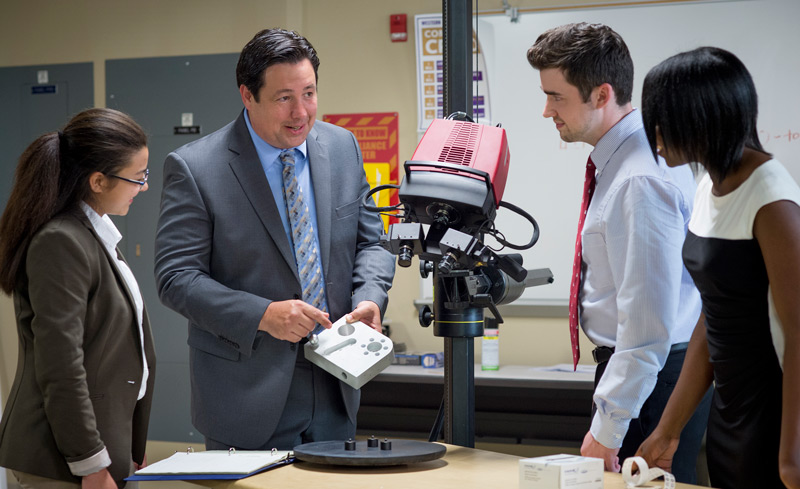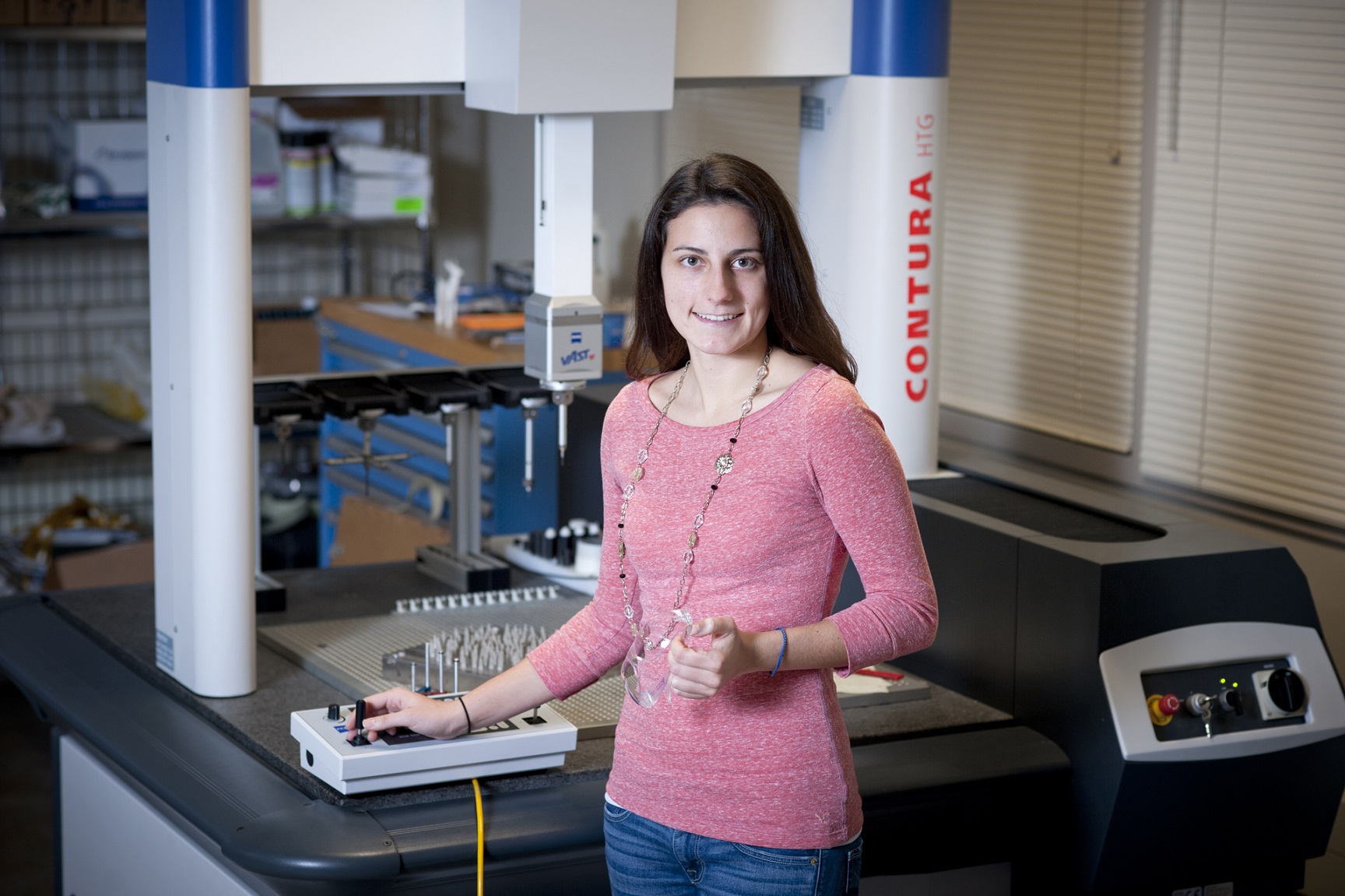- Academic Programs & Support
- Departments, Schools & Colleges
- College of Engineering and Technology
- About the College
- Departments
- School of Engineering + Technology
School of Engineering + Technology

Whether in concept design and development or in applications and manufacturing, students in the School of Engineering + Technology work with outstanding faculty members who bring industry and business expertise to the classroom. The program emphasizes the hands-on application of theoretical and technical concepts through project-based learning (PBL), and students work on real-world assignments with companies across Western North Carolina, and beyond, through our nationally recognized Rapid Center.
The school's curriculum focuses on the development of critical thinking and decision-making abilities to help prepare students for the challenges they will face in a wide variety of engineering and technology careers.
Degree Programs
ABET Accredited Programs
Electrical Engineering, B.S.E.E.
Engineering, B.S. - Concentrations in Mechanical, Manufacturing, and Electric Power
Engineering Technology – Applied Systems Technology, B.S.
Electrical and Computer Engineering Technology, B.S.
Other Programs
Engineering Technology – Technical Operations, B.S. (Distance)
Master of Science in Engineering Technology
Transfer Students
Transfer as seamlessly as possible from a community college to one of the WCU Engineering
programs.
Learn More
As part of the School of Engineering + Technology's focus on project-based learning, students are required to participate in a two-semester senior capstone project. Working under the guidance of faculty and industry mentors, teams of two-to-four seniors tackle complex, real-world challenges proposed by industry sponsors who have been invited by The Rapid Product Center.
Working with course instructors, a faculty mentor, and a mentor selected by the project sponsor, teams will use a multidisciplinary approach including electrical engineering, electrical and computer engineering technology and engineering technology. To simulate a real work environment, teams use a stage/gate process, progressing from a project proposal to a minimum of three conceptual designs; continuing to a preliminary design review, a critical design review, and fabrication and testing of a prototype or proof of concept; and finishing with a wrap-up of documentation, test results and modifications, if needed, to resolve any issues revealed through testing.
Students gain valuable experience by working on a real industry-sponsored project; analyzing and solving engineering problems; learning teamwork and presentation skills; setting goals, specifying deliverables and meeting deadlines; testing and modifying their work; and achieving measurable results. The proof that students can apply what they are learning will give them a distinct advantage in launching a career or applying for graduate school.
The College of Engineering and Technology is unique in making project based learning an integral part of the entire curriculum. From a student's first day on campus, our faculty and staff are committed to providing both instruction in the fundamentals of the courses they teach and guidance in how to apply the fundamentals to solve problems, improve processes and create new knowledge. As a result, our graduates have a distinct advantage, based on the theory they have learned and the experience they have gained, when they go on to advanced studies or begin to work in their chosen careers.
Our students work with other students, faculty and staff, corporate partners and project sponsors to solve problems and find solutions that will have impact. As a result, we have undergraduates who are receiving patents and getting their work published in prestigious journals. A significant number of our graduates have gone on to earn prestigious fellowships for study at the masters and Ph.D. levels.
Working before graduation is a great way to earn money and gain experience. Internships are the most popular option. Students work in professional environments with engineers on practical problems. What you gain supports academic studies and professional preparation. Internships involve design, manufacturing, and testing. Internships are offered by many companies across the region, state, and nation. Companies require interns from all programs in the school. Industries include aerospace, automotive, medical, electronics, utilities, and defense agencies.
The School of Engineering + Technology supports students in the internship process. The Project-Based Learning core prepares all students with professional skills for the workplace and technical applications. Regional employers seek students through campus career fairs, college social media, and on-campus recruiting events. The WCU Center for Career and Professional Development provides numerous resources including resume preparation, practice interviews, employment opportunities, and professional practice seminars.
The School of Engineering + Technology at Western Carolina University has several student chapters of national engineering societies. Activities include meetings, guest speakers, trips, competitions, service projects, leadership opportunities, scholarships, networking, career guidance and more.
Professional engineering societies can support students while in school and in their future careers. These societies help members stay informed, connected, and growing professionally. They coordinate public outreach, education and service opportunities. Several of the professional societies provide scholarship, internship, and job opportunities for students.
WCU's School of Engineering + Technology has Student Chapters of the following professional engineering societies:
Institute of Electrical and Electronic Engineers (IEEE)
- For more information on how to join, please visit the IEEE website or contact Adam Harris.
Society of Automotive Engineering International (SAE)
- For more information on how to join, please visit the SAE website or contact Tom Spendlove.
American Society of Mechanical Engineering (ASME)
- For more information on how to join, please visit the ASME website or contact Martin Tanaka.
National Society of Black Engineers (NSBE)
- For more information on how to join, please visit the NSBE website or contact Paul Yanik.
Society of Manufacturing Engineers (SME)
- For more information on how to join, please visit the SME website or contact Basel Alsayyed Ahmad
Society of Hispanic Professional Engineering (SHPE)
- For more information on how to join, please visit the SHPE website or contact Scott Pierce
Tau Beta Pi The Engineering Honor Society (TBP)
- For more information on how to join, please visit the TBP NC ETA Chapter website or contact Martin Tanaka
Faculty
Faculty and Staff can be reached virtually by going to our College of Engineering and Technology Contact Page
Alsayyed, Basel
Assistant Professor
Engineering Technology Program Director Industrial Engineering/ Design & Manufacturing
Ritenour, Andrew
Assistant Professor
Electrical and Computer Engineering Technology Program Director, Rapid Center Fellow, Electrical Engineering
Thompson, Amber
Associate Professor
Distance Learning Program Coordinator, Engineering Graphics, Rapid Prototyping

